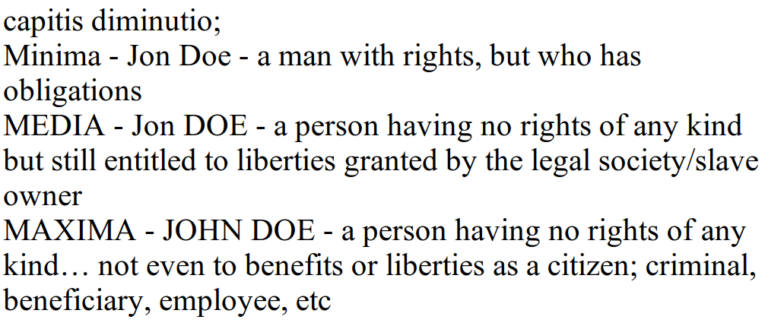Empower Yourself with Solutions You Need
Unlock your path to financial freedom and sovereignty by challenging conventional systems and reclaiming your rights. Dive into our resources designed for those seeking a private life, setting their own laws, and transforming lives through understanding the current system to achieve financial freedom. Engage in transformative thinking with our expertly crafted content, which guides you in creating laws for yourself to protect your family and your property. Demystifying the general misinformation that distracts us while gaining clarity on the truths hidden within the system. Once you understand this knowledge, you will achieve independence and empowerment, mastering complex systems to secure your freedom. Begin your journey to financial freedom and sovereignty today.
Discover the Reasons Behind Your Search
Are you facing financial or legal challenges? Many of us find ourselves in difficult situations, often due to systemic issues beyond our control.
At Solutions You Need, we aim to uncover the root causes of these problems and provide you with the tools and knowledge to navigate them effectively.
Whether you are dealing with financial distress, legal complexities, or simply seeking truth in a confusing world, we are here to guide you on your journey to empowerment.

Unlock Your Path to Financial Freedom and Sovereignty

Deception for power has been a part of human history since the dawn of written language. Today, with the internet and an overwhelming flood of information, many are left questioning: Why is this happening? Can this be done? Is this lawful? What is legal? What should I read? What should I believe? This may make sense, but does it work? What will happen if it goes wrong? What do I do?
At Solutions You Need, we have delved into every possible avenue to uncover the truth. While much didn’t feel right, some things did, but lacked evidence. So, we kept searching. Our mission is to cut through the confusion and misinformation that inundates us daily. We aim to show you how to navigate and use the system to your benefit, whether as a man, woman, or by leveraging the legal framework designed for us.
Join us in demystifying the complexities of our world, reclaiming your rights, and achieving financial freedom and sovereignty. We provide the knowledge and tools necessary for transformative thinking and personal empowerment. Understanding these truths will help you achieve independence, master complex systems, and secure your personal freedom. Begin your journey to financial freedom and personal sovereignty today.
Understanding Legal Interactions: Civil, Criminal, and Actual Crime
In the legal system, interactions are categorised into three primary areas: civil law, criminal law, and actual crimes. Each of these areas has distinct roles and structures, allowing for a nuanced approach to justice and legal engagement. This guide will clarify these categories and how they function within the legal framework.
Civil Law: Legal Personhood and Corporate Interaction; The Law of Equity
Civil law deals with disputes between individuals or entities, often involving contracts, property, or business transactions. In these cases, individuals interact with corporations and other entities through a legal persona. Individuals and corporations are considered “legal persons,” enabling them to enter contracts, sue, and be sued. This concept is crucial for participating in commerce. For example, a typical case might be Corporation v. Mr. Xyz, where Mr. Xyz is treated as a legal entity for the purpose of the lawsuit. According to Black’s Law Dictionary, a legal person is an entity recognised by law as having rights and duties. The principle of legal personhood facilitates interactions in civil law, as outlined in various legal frameworks worldwide.
Criminal Law: The State as Representative of Society; The Law of Mankind
Criminal law addresses offenses against the societal order. These cases are framed as State v. John Doe, where the state prosecutes the accused on behalf of society. The state represents the collective interests of the community, prosecuting crimes to maintain public order and safety. The state ensures that laws are upheld, emphasising the broader impact of criminal behavior. Legal systems, such as those based on a combination of statutory law and common law in English law and the Model Penal Code in the U.S. Which structure criminal cases to reflect the state’s role in maintaining public order. Victim impact statements in criminal proceedings highlight the personal harm caused by crimes.
Actual Crimes: Living v. Living
Actual crimes involve direct harm between individuals, such as assault, theft, or murder. These cases focus on the interactions between living beings. Crimes typically involve one individual causing harm to another, emphasising direct personal responsibility. While the state prosecutes these cases, the underlying issue is between the individuals involved. The state acts as a protector of individual rights, ensuring justice for the victims through prosecution. The distinction between public (criminal law) and private law (civil law) ensures comprehensive justice, as detailed in legal textbooks and scholarly articles.
Feeding misinformation to the mind can have various consequences, both cognitive and emotional. Some potential effects are:
Cognitive Distortion:
Belief System Alteration: Misinformation can lead to a distortion of one’s belief system. If false information is consistently reinforced, it may alter an individual’s understanding of reality.
Confirmation Bias: People may selectively accept information that confirms their existing beliefs, even if it’s false, while rejecting information that contradicts those beliefs.
Psychological Impact:
Stress and Anxiety: Being exposed to misinformation or believing in false information can induce stress and anxiety, especially if the misinformation is fear-inducing.
Cognitive Dissonance: Holding conflicting beliefs, especially if one is aware of the misinformation, can create cognitive dissonance—a psychological discomfort that may lead to mental stress.
Social and Interpersonal Effects:
Conflict and Division: Misinformation can contribute to the spread of rumors and the creation of false narratives, leading to societal divisions and conflicts.
Distrust: Exposure to misinformation, especially in the context of deliberate disinformation campaigns, can erode trust in institutions, authorities, and other people.
Behavioral Changes:
Altered Decision-Making: Believing in misinformation can influence decision-making processes, leading to actions based on false premises.
Polarization: Misinformation can contribute to the polarization of societies as individuals and groups become entrenched in opposing, often inaccurate, viewpoints.
Educational Impact:
Misconceptions: If misinformation is integrated into educational materials, it can lead to the development of misconceptions that are challenging to correct later on.
It’s important to note that the impact of misinformation can vary depending on factors such as the individual’s critical thinking skills, susceptibility to persuasion, and the context in which the misinformation is encountered. Combating misinformation involves promoting media literacy, critical thinking, and fact-checking skills to help individuals navigate an increasingly information-rich environment.
Balancing Sovereignty and Legal Engagement
The legal system accommodates personal sovereignty while allowing individuals to interact with corporations. This dual framework supports both private rights and public order. Individuals can assert their rights and responsibilities as living beings, particularly in matters of personal harm and justice. By adopting a legal persona, individuals can effectively engage in commerce and civil legal matters. Understanding the dual roles of individuals as both private man or woman and legal persons is essential for navigating legal systems effectively.
The legal system provides a structured approach to handling civil disputes, criminal cases, and actual crimes. By recognising the distinctions and roles within each category, you can better understand your rights and responsibilities. This comprehensive understanding helps maintain a balance between sovereignty and effective engagement in the legal and corporate world. This guide aims to clarify these concepts for better legal literacy and informed participation in various legal contexts.
Challenging Ambiguity in Legal Personhood and Criminal Law
The relationship between natural persons and legal entities, particularly in criminal law, presents significant questions about legal personhood, consent, and ownership. These issues are essential to explore and potentially challenge for a clearer and fairer legal system.
When a birth certificate is issued, it records the birth of a natural person. Some legal theories suggest that the use of all caps on birth certificates creates a separate legal entity or “strawman” that can engage in legal and commercial activities. By using the birth certificate to apply for, say a driving license, the individual voluntarily enters into an agreement with the state. This agreement signifies consent to be recognised as a legal person and to abide by the rules and regulations associated with that legal status. The principle “agreement makes the law” applies here, indicating that by agreeing to the terms, the individual accepts the legal framework.
To challenge the ambiguity between the natural person and the legal entity, several steps can be taken. One approach is to clarify the individual’s intent and understanding at the time of entering into agreements. This can be done by documenting consent, ensuring that the individual is fully aware of the implications of using their legal persona in various agreements, and formally expressing any reservations or conditions under which the individual consents to be recognised as a legal person.
Legal challenges can also be brought before the courts to address specific instances where the distinction between the natural person and the legal entity creates ambiguity or injustice. Examining and relying on legal precedents where courts have addressed similar issues can provide a basis for challenging the current practices. Additionally, advocating for legislative changes to address and clarify the legal status of individuals and their legal personas is crucial. Proposing new legislation and raising public awareness about the issue can build support for necessary changes.
Ownership of the Legal Entity: The legal entity created by the birth certificate is not owned by the individual but is a construct recognised by the state for legal and administrative purposes. The state, in essence, holds authority over this legal persona, as it is created and maintained by governmental systems. The state has the power to create and regulate legal entities, including the legal persona represented by the all-caps name on a birth certificate. This authority includes the ability to set rules and regulations governing the use of this legal persona. In some legal theories, the individual is considered the beneficiary of the trust (the legal entity), while the state or governmental bodies act as trustees. This relationship can be complex and is often interpreted differently depending on legal jurisdiction and context.
Challenging the ambiguity between the natural person and the legal entity involves understanding the principles of legal personhood, consent, and ownership. By clarifying intent, bringing legal challenges, advocating for legislative changes, and understanding the state’s role in creating and regulating legal entities, individuals can better navigate and potentially challenge the current legal framework. This approach aims to ensure that the rights and responsibilities of natural persons are clearly distinguished from those of their legal personas, fostering a more just and transparent legal system.
Understanding the Impact of Legal Personhood on Natural Persons
The relationship between the state, the legal entity, and the natural person involves complex legal principles that can have significant implications for the rights and responsibilities of individuals. When a natural person uses their birth certificate to enter into agreements with the state, such as applying for a driving license, they may not fully realise that they are consenting to be recognised as a legal person. This recognition can have lawful impacts on their status and rights as a man or woman.
Forfeiting Rights for Benefits
One of the key issues is that by accepting the benefits associated with legal personhood (such as the ability to drive, work, and engage in commerce), individuals may inadvertently forfeit certain rights. This occurs because they enter into agreements that bind them to the legal framework established by the state. These agreements often include adhering to laws, regulations, and obligations that may limit certain freedoms in exchange for the benefits provided.
For example, by obtaining a driving license, a person agrees to abide by traffic laws and regulations. Failure to comply can result in legal penalties. This is a clear instance where an individual’s actions, while operating under the legal entity, subject them to state control and legal consequences.
Lawful Impacts on the Living Man
The lawful impacts on the living man, resulting from the use of the legal persona, include several key aspects:
Legal Obligations: The individual is required to fulfill legal obligations that come with the benefits they receive. This includes paying taxes, following regulatory requirements, and adhering to contractual terms.
Accountability and Liability: The legal persona can be held accountable and liable for actions taken under its name. This means that individuals can face legal consequences, such as fines or imprisonment, for breaches of law conducted through their legal persona.
Limited Autonomy: While legal personhood allows individuals to engage in various activities, it also subjects them to the legal system’s rules and constraints. This can limit personal autonomy in favor of maintaining public order and safety.
State Authority: The state holds significant authority over the legal entity, including the ability to enforce laws and regulations. This control extends to various aspects of the individual’s life, particularly those involving legal and commercial interactions.
The comparison of reality and fiction within the mind is a complex and multifaceted topic that involves aspects of psychology, perception, cognition and creativity:
Perception and Reality:
Reality: Refers to the objective, external world that exists independently of an individual’s thoughts or perceptions.
Fiction within the Mind: Involves the subjective interpretation of reality, influenced by individual perceptions, biases, and experiences.
Cognitive Processes:
Reality: Our brains receive sensory input from the environment, process it, and construct our perception of the world around us.
Fiction within the Mind: Imagination and creativity play a significant role in constructing mental simulations, scenarios, and fictional narratives that may deviate from objective reality.
Belief and Suspension of Disbelief:
Reality: Often grounded in empirical evidence and facts, shaping our beliefs about the external world.
Fiction within the Mind: Involves the ability to suspend disbelief, allowing individuals to engage with and accept fictional scenarios or narratives as if they were real for the sake of enjoyment or exploration.
Emotional Responses:
Reality: Emotional responses are often linked to real events and experiences.
Fiction within the Mind: Imaginary situations and characters can evoke genuine emotions, demonstrating the powerful impact of fiction on human psychology.
Purpose and Function:
Reality: Serves as the basis for our daily interactions, decision-making, and understanding of the world.
Fiction within the Mind: Can serve various purposes, including entertainment, escapism, moral exploration, and the expression of creativity.
Neurological Processes:
Reality: Neural processes related to perception, memory, and cognition contribute to our understanding of the real world.
Fiction within the Mind: Engages similar neural networks, with imagination and creative thinking involving various brain regions associated with memory, emotion, and abstract thought.
Cultural and Social Influence:
Reality: Shaped by cultural, social, and historical factors that influence our collective understanding of the world.
Fiction within the Mind: Reflects cultural narratives, myths, and storytelling traditions that contribute to the shared imaginative experiences of societies.
In summary, the comparison between reality and fiction within the mind highlights the dynamic interplay between objective reality and subjective interpretation. Our minds have the remarkable ability to navigate both realms, drawing upon cognitive processes, emotions, and creativity to construct a rich and multifaceted understanding of the world.
Beyond the illusion…
When we know within; when we stop: feel and breathe: we start to appreciate the world around us, the beauty, the magnificence of it all.
After a little practice, we know there is more to life than the illusion we are conditioned to and see far more than the petty nonsense we have become so accustomed to.
What is it that we are aware of; the system construct we are in is a fictional realm, and requires us, the men and women to play/act roles/titles, we call persons/personas, and we are surety for these parts/persons we play, but we are not the person.
All should be fine, a sound system in theory because we as living men and women are interacting with perpetuities that are not living, there is a need to allow interaction, and titles are brought into play. Acting a title would work well if it was done fairly…and we were given the rules.
However not only are we not told the rules, but the meanings of the words that make the rules have been “altered” and new words created and given alternative common meanings, they generally mean the opposite.
Words are (s)words and spelling is spell casting; deceiving. Pay attention to all that is written, there are many meanings…traps.
The words that we read from the perpetuities are in and for the fiction, they are evident when you read with knowledge and clarity, read everything over again to find its context on the page. This we can do once we know the rules and about titles.
So, we can be non-fiction in our natural state or fiction and own title(s).

Avoid confusion
Consider travelling abroad and driving on the other side of the road, this takes some thought then gets easier, and you have to readjust when you return.
To be a non-fiction in the Private as one of Mankind, or a fiction in the Public to take a title/person/token and play monopoly.
To help us focus we shall use a coin:

On one side of the coin is the head, representing non-fiction, mankind, and reality. The monarch swore an oath to uphold the rights and property of man according to the Bible. On the flip side, tails represent fiction and titles.
As you navigate life, visualise the coin: heads up for non-fiction and tails up for fiction. Ask yourself, is this matter I am dealing with rooted in reality or fiction?
Unlock Your Path to Financial Freedom and Sovereignty.
Non-Fiction: Mankind
Private
Man Woman
Tangible objects/property
Natural law
Compensation
Pay
Money Gold/Silver
Self responsibility
Fiction: Title(s)
Public
Titles
Equitable/Legal title to property
Legal
Job/Income
Payment
Cash/Fiat Currency/Legal Tender
State control
Reversing the Impact of Legal Personhood Agreements
If an individual entered into agreements using their birth certificate without fully understanding the implications or realising that they were forfeiting certain rights, there are steps they can take to potentially reverse or mitigate this position. This process involves both legal and practical strategies to reclaim autonomy and address any misunderstandings about their legal status.
If you’ve entered agreements using your birth certificate without fully understanding the implications, we can help guide you through the process to reclaim your rights and autonomy.
Of Mankind
Elevate your frequency and break free from the low vibrations emitted by the controllers. Start by turning off the TV, especially the news, and avoiding negative feeds. Our subconscious manifests what we focus on, a fact well-known to the controllers.
Question everything and look within. True freedom lies within us. Embrace your inner child, confront and heal past pains, and forgive to heal your soul.
It’s crucial to remember and exercise our inherent rights, which hold power beyond man-made rules and laws. Reclaiming these rights empowers us to rise above the imposed limitations and embrace financial freedom and sovereignty.
Navigating the Duality of Legal Entity and Living Man
To navigate the complex legal system, it’s essential to understand the duality between the legal entity and the living man. The legal system operates on rules that distinguish between your natural person and the legal persona created through documents like birth certificates. Knowing the roles and titles you assume within this system is crucial for effective navigation and asserting your rights.
Understanding how the legal system is designed, including its remedies, allows you to interact with it more effectively. This system requires you to adopt certain titles and roles, but only one title truly matters for exposing the injustices and reclaiming your rights. By defending your position and countering legal challenges, you can avoid becoming a victim to those who exploit the system for their gain. Equip yourself with knowledge and assert your rightful title to navigate and overcome the legal intricacies.
Affidavit and Lien
Understanding affidavits and their significance within the legal system is crucial. Perpetuities, corporations, and courts are not living entities and thus cannot directly hear living men and women. To bridge this gap, living individuals must know how to present evidence to a court effectively.
An affidavit is a powerful legal instrument in which an individual swears under penalty of perjury that the statements contained within are true. If the affidavit remains unrebutted by the opposing party, it can be taken as evidence and may influence the court’s decision. In some cases, this may create the basis for a lien against the opponent’s property, which can then be enforced through legal processes.
Customer Testimonials
Support Our Mission
We believe in empowering individuals with the knowledge to reclaim their rights and challenge unjust demands. Your gift not only equips you with valuable tools but also supports our ongoing efforts to provide accurate, actionable information. Together, we can make a difference and continue to fight corruption. Thank you for your support! Please click here
Legal vs. Law: A Clear Distinction
Legal: Legal pertains to written law, known as legislation, which governs the governors. This is exemplified by the Bill of Rights 1688.
Case Law: Case law, set by precedent, is considered law but is not listed on legislation.gov.uk. It reflects judicial decisions over time.
Agreements: Agreements are binding and considered law for the parties involved.
Crime: Crime is defined as a trespass causing harm, damage, or loss.
Civil Matters: Handled in county courts or chambers, civil matters involve agreements and trust law.
Criminal Matters: Criminal matters involve breaches of agreements made under legal fictions.
Note :
We do not offer legal advice.
Please do your own research before administering your remedy.
We do not claim to have written all content, some has been researched, bought or given.
We do not charge for any content, we ask that you gift us for our time collating the information and to enable further research into the solutions you need.
© 2024 Copyrights Solutions You Need



